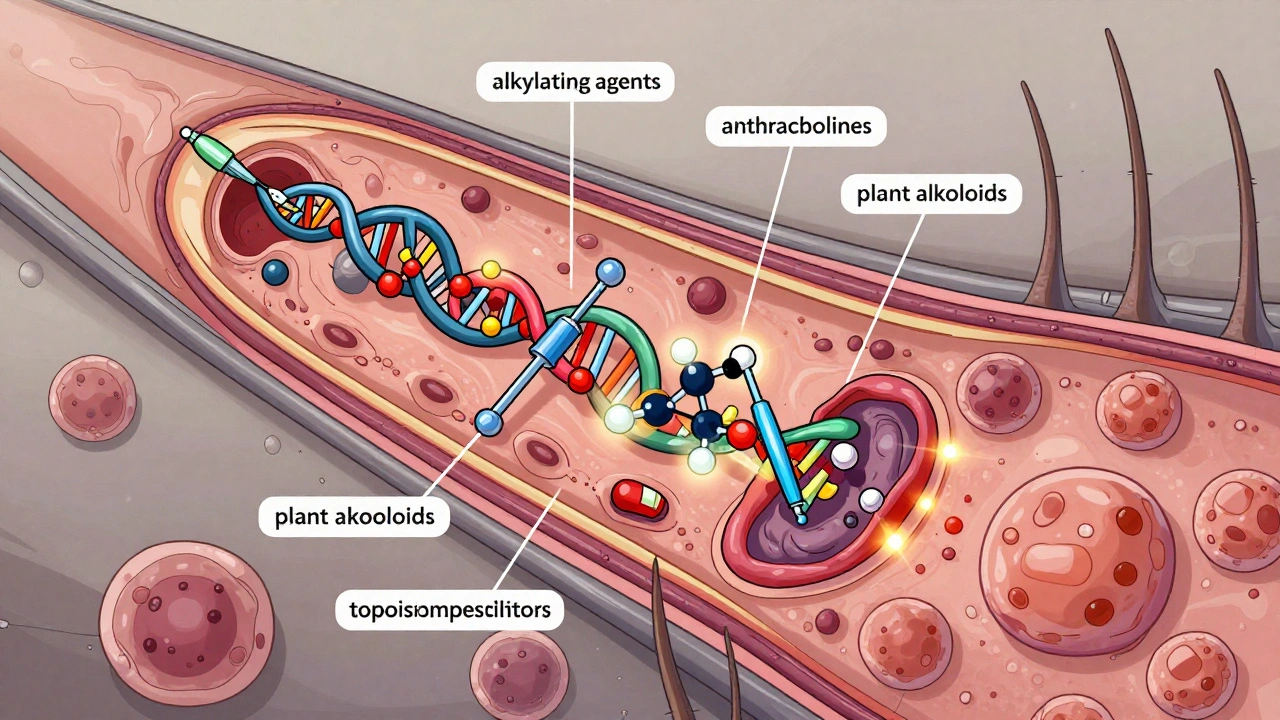Chemotherapy uses cytotoxic drugs to kill rapidly dividing cancer cells, but also affects healthy cells, causing side effects like fatigue, hair loss, and nerve damage. Learn how it works, why it's still essential in 2025, and how to manage real-world side effects.
Chemotherapy Side Effects: What to Expect and How to Deal With Them
Chemo can feel like a roller‑coaster. One day you’re fine, the next you’re battling nausea, hair loss, or fatigue. Knowing what’s likely to happen helps you plan, and a few smart moves can make the ride smoother.
Why chemo makes you feel lousy
Chemo drugs target fast‑growing cells. Cancer cells grow fast, but so do some healthy cells in your gut, hair follicles, and bone marrow. When chemo hits those healthy cells, you notice the side effects. The good news? Most of these effects are temporary and many can be softened with the right tricks.
Common side effects and easy ways to handle them
Nausea and vomiting – Try eating small, bland meals a few hours before treatment. Ginger tea, crackers, or a banana can calm your stomach. Your doctor may also prescribe anti‑nausea meds that you can take right before chemo.
Hair loss – Hair usually starts shedding a week or two after the first round. If you want to keep the look, a soft skull cap or a loose wig works well. Keep the scalp clean and avoid harsh chemicals; gentle shampoos are best.
Fatigue – Rest when you can, but don’t stay in bed all day. Light activity—short walks, stretching, or gentle yoga—helps keep energy up. Keep a sleep schedule and limit caffeine late in the day.
Low blood counts – Chemo can lower white cells, red cells, and platelets. Eat iron‑rich foods like beans, spinach, and lean meat. If your doctor says it’s safe, a short walk after meals can boost circulation and support blood production.
Mouth sores – Rinse your mouth with a salt‑water solution (½ teaspoon salt in 8 oz warm water) several times a day. Soft foods, smoothies, and avoiding spicy or acidic drinks reduce irritation.
Changes in taste – Food may taste metallic or bland. Try plastic utensils, add herbs like mint or rosemary, and experiment with cold meals that often taste better when your palate is off.
Skin changes – Chemo can dry out skin. Use fragrance‑free moisturizers after showering and protect sensitive spots with sunscreen. If you notice a rash, talk to your clinician before applying any new creams.
Every person’s response is different, so keep a log of what you feel and when it happens. Share that list with your oncology team; they can adjust doses or add supportive meds.
When you’re dealing with kids, the same rules apply but kids may need extra help. Smaller, frequent meals, fun‑shaped ice pops for hydration, and a favorite blanket for comfort can make a big difference.
Remember, side effects are signals that your treatment is working, but they’re also signals your body needs extra care. Keep the conversation open with your healthcare providers, stay hydrated, and lean on family or support groups when the going gets tough.
With the right strategies, you can focus more on beating cancer and less on the annoyances that come with chemo. Stay proactive, ask questions, and give yourself credit for getting through each treatment day.
Explore how Chlorambucil interacts with the immune system, what cells it targets, side‑effects to watch for, and tips for managing infection risk.

